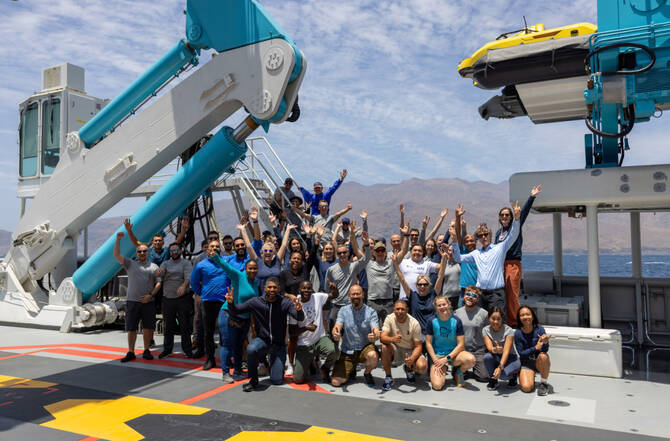
- ARAB NEWS
- 01 Aug 2025

RIYADH: As the curtains closed on this year’s UN Ocean Conference in the French city of Nice, the Saudi-led foundation OceanQuest emerged as one of the standout contributors to marine sustainability — not only in policy circles but also in the depths of the world’s oceans.
Fresh from its pioneering Around Africa Expedition, OceanQuest, in partnership with OceanX, brought remarkable scientific discoveries and a powerful message to UNOC — that true marine conservation must combine exploration, collaboration, and education.

“This expedition went around Africa and engaged on-ship around 16 African scientists and more than 200 port stops,” Martin Visbeck, CEO of OceanQuest, told Arab News.
From surveying megafauna by helicopter to exploring seamounts more than 1,000 meters beneath the surface aboard the OceanXplorer, the team used cutting-edge technology and human ingenuity to illuminate previously uncharted ecosystems.
OceanQuest is a Saudi non-profit incubated at the King Abdullah University of Science and Technology. It is rapidly becoming a key player in the global marine science arena, dedicated to deep-sea exploration, design innovation, and cross-border collaboration.
One of its flagship missions — the Around Africa Expedition — offered not only new data but a model of inclusive, equitable marine science.
Using robotic vehicles, manned submersibles, and remote sensing tools, the team made multiple dives during the mission.
In total, they spent 53 hours underwater, collected nearly 90 samples, and mapped thousands of square kilometers of the seabed, including around the Nola Seamounts and Santo Antao Island. Flights over 922 nautical miles provided additional data on large marine animals.
Among the major outcomes was the identification of new underwater seamounts, crucial for fisheries and marine biodiversity.
“We will be the ones who go to seamount systems and explore what is there, look at the species, look at the functions and understanding, then share that with the community, to provide reasons why certain seamounts should be protected,” said Visbeck.
This insight is critical as countries consider the ratification and implementation of the High Seas Treaty — formally the Marine Biodiversity of Areas Beyond National Jurisdiction agreement — a major focus at UNOC.

“Biodiversity protection beyond national jurisdiction means the protected areas in the high seas, outside of a country’s own legal role,” said Visbeck.
OceanQuest’s approach is not just technical — it is human-centered.
Working alongside top African entities such as the National Research Foundation, the University of Cape Town, and the South African National Biodiversity Institute, the expedition helped build capacity for African marine science.
Twenty-four early-career professionals from across the continent were trained in seafloor mapping, environmental DNA analysis, and deep-sea sampling.
“This wasn’t just about what we discovered in the ocean. It was also about who we empowered on the ground,” said Visbeck. “By investing in people — students, young professionals and educators — we’re building a foundation for Africa’s long-term leadership in ocean science.”
He sees this collaborative model as a roadmap for future conservation.
“These collaborations are the future of ocean science in Africa,” he said. “We’ve seen what’s possible when scientists, governments and regional institutions align behind a common purpose, advancing knowledge, access and opportunity.”
This year’s UNOC provided the perfect platform for OceanQuest to share these achievements and ambitions.
“I decided that it would be amazing to celebrate and launch OceanQuest and share with the ocean world our arrival on the scene at UNOC,” said Visbeck.

“We are using UNOC to celebrate with our partners, friends and ocean-policy people on the scene and share with them our mission and vision.”
In a time of mounting ocean crises — from plastic pollution to overfishing and climate change — Visbeck says awareness is a powerful tool.
“What we are trying to do is fight ignorance by providing data and information. Once the information is more clear, it can be a basis for regulatory agencies.”
From the Red Sea to the high seas, OceanQuest is helping reframe the future of ocean conservation — not just by mapping the seafloor, but by drawing a new map for global cooperation.
